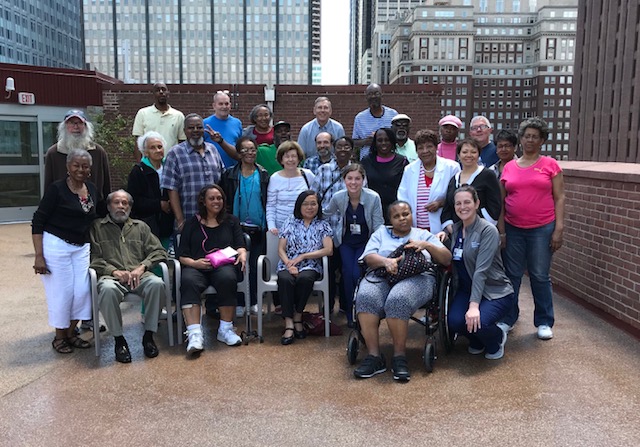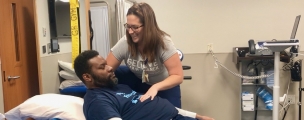Each and every day, we use communication to express ourselves. For most of us, talking comes effortlessly and we don’t have to give it much thought. We are able to order our morning coffee the way we want it. We are able go out to lunch with friends and talk about weekend plans. We are able to see a doctor when we aren’t feeling well and describe our symptoms in order to get the best treatment. Can you imagine waking up one day not being able to talk or get the right words out? Or to hear people talking around you but be unable to fully understanding what they are saying?
Believe it or not, this is the daily experience for more than 1 million people in the U.S. who are living with a language disorder called aphasia. June is Aphasia Awareness Month, and here at Magee, we want to increase awareness of this commonly unheard of and often misunderstood condition.
So, what is aphasia? Aphasia is a communication disorder caused by stroke or brain injury that affects a person’s ability to use and/or understand language. It is important to note that aphasia does not affect a person’s intellect. The severity of aphasia can vary from person to person. For some, it makes communication virtually impossible, and for others, it’s quite mild. Aphasia can make it difficult for a person to name objects, to put words together into sentences, to follow a conversation, or to read and write.
Here at Magee, an aphasia support group meets monthly. I have been blessed to have the opportunity to co-facilitate the group for the last three years. Magee’s Aphasia Community Support Group provides a safe, supportive environment for individuals with aphasia and their loved ones to practice communication skills, socialize, learn communication strategies and the most up-to-date interventions, and support one another. Members have been coming to the group since it first began many years ago and have greatly benefited from the unyielding support, learning, and sense of camaraderie it offers.
At our most recent meeting last week, the group (pictured above) celebrated Aphasia Awareness Month by discussing the condition in their own words. Their responses below are both enlightening and inspiring!
What does aphasia mean to you?
“I know what I want to say, but I can’t say it.”
“Confusion”
“Lack of communication”
“Challenging myself to be heard and to make sure everyone understands what I have to say”
“I talk a lot better, but just a few minutes ago I couldn’t say my daughter’s name. So that’s a part of aphasia I’m not used to. I get in the middle of something and the wrong word comes out or nothing comes out.”
What do you wish people knew more about aphasia?
“Many times we are very misunderstood … and it’s not that we have a lack of intelligence, but we may have a problem sometimes finding the words.”
“People with aphasia are trying to get their words out, and the public needs to give them the chance to get them out.”
“We aren’t dumb. We know in our heads, but we can’t always express ourselves.”
“Take your time with us. Be patient.”
What can people do to make communication easier?
“Slow down.”
“Make questions simpler by asking yes or no.”
“Don’t rush people or try to finish their sentences. Give them extra time.”
“Be patient with me. I’m trying.”
How has Magee’s Aphasia Support Group impacted your life?
“I love these guys because they get it.”
“World? No. This group? Yes.”
“They’ve shown me different ways to communicate better.”
“The group has helped me to be more thoughtful.”
“No one is judging anyone else, and we can just be who we are.”
“We teach each other and encourage each other.”
Interested in joining Magee’s Aphasia Community Support Group? The group meets the first Tuesday of each month (except for August) and is led by Magee Speech-Language Pathologists Ashley Owens and Cydney Fox. To join, please contact Ashley at 215-587-3484.







